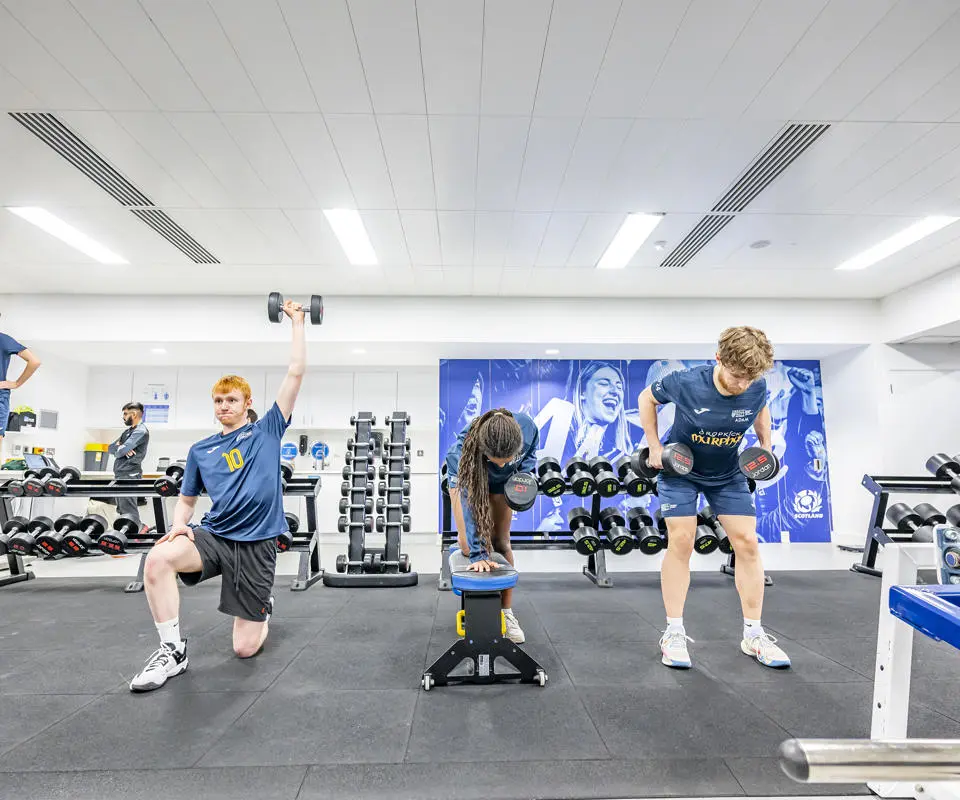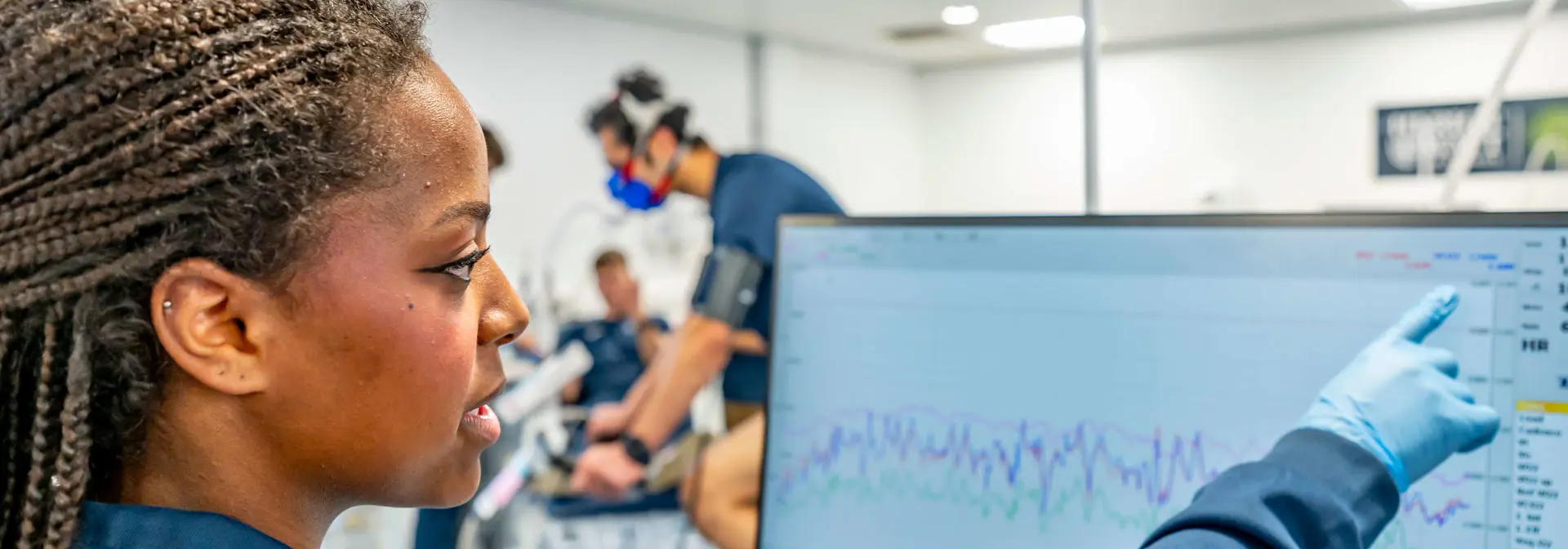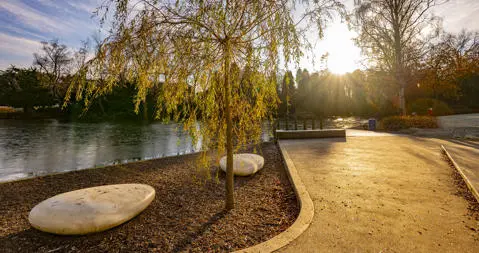Key information
Find out more about our 3 year honours degree option.
- UCAS code
- C6SS
- Level
- Undergraduate
- Delivery type
- Full Time
- Degree qualification
- BSc (Hons)
- Mode of delivery
- On-Campus
- Duration
- 3-4 years
- Location
- Edinburgh
- Start date
- September
BSc (Hons) Sport and Exercise Science combines theory and applied learning to create an inherently interesting and broadly defined university degree. Our industry links and cross-disciplinary learning ensures our teaching is relevant in the real world, and you’ll experience what it is like to be a sport and exercise scientist working in practice.
You’ll gain knowledge in all the three core areas of sport and exercise science including physiology, psychology, and biomechanics. You’ll learn to apply this knowledge and gain experience across a variety of professional settings including strength and conditioning, nutrition, data analysis and research, understanding the impact of exercise and sport, and sport and exercise science on our daily lives.
By studying BSc (Hons) Sport and Exercise Science, you’ll explore evidence-based strategies for promoting health and preventing lifestyle-related diseases and the impact this has on a variety of different populations. Throughout your studies, you’ll develop practical skills as well as the ability to plan, conduct, critically analyse, and interpret results of practical work in the field and laboratory.
As well as developing expertise in sport and exercise science, our programme builds sought after soft skills, such as problem-solving, communication skills, and practical technology skills. You’ll also understand the role of sport and exercise scientists in professional fields including performance sport, exercise prescription, adherence, research, and public health.
This industry-focused degree will ensure you have the understanding, knowledge, skills, and personal qualities required to undertake a wide range of careers within sport and exercise science or other employment sectors.

Heriot-Watt Sports Scholarships
The Heriot-Watt Sports Scholarship programme supports talented athletes in balancing their academic studies with sporting ambitions. Scholarships offer tailored benefits such as financial support, access to world-class facilities, and specialist coaching. Learn more about how to apply.
Heriot-Watt Sports ScholarshipsYour student experience
Your learning will be informed by the expertise of our research-active Sport and Exercise academic staff from the Institute of Life and Earth Sciences which sits within the School of Energy, Geoscience, Infrastructure and Society (EGIS); with this supported by the experienced practitioners from the Oriam Performance Team, bringing in expertise from working with leading athletes from across Scotland.
EGIS is one of the United Kingdom’s leading institutions for multidisciplinary research and teaching in areas critical to economic development and societal equity. Our teams work closely and have links with industry, and practitioners are regularly invited as guest lecturers in most courses and advise on student research projects.
Go Global
There are currently no Go Global opportunities for this particular programme. However, other Go Global opportunities may be available. Please contact studywithus@hw.ac.uk for more information.
Course content
September Intake - Edinburgh
Year 1
You’ll take eight mandatory courses in year one where you will be introduced to the principles of sport and exercise science, introductory biology, psychology, musculoskeletal anatomy, and physiology. You’ll also take a course designed to inspire awareness of the contribution of your discipline to tackling global challenges and its connection to other disciplines. You’ll work in teams, learn to cope with complexity, gain core study skills, and thrive on ambiguity.
Mandatory September
- Introductory Biology 1
- Shaping Tomorrow Together A
- Principles of Sport and Exercise Science
- Introduction to Psychology 1
Mandatory January
- Shaping Tomorrow Together B
- Musculoskeletal Anatomy and Physiology
- Introduction to Psychology 2
- Introductory Biology 2
Year 2
In year two, you’ll develop your fundamental knowledge of sport and exercise biomechanics, and physiology and psychology, as well aiding your development as a professional in sport and exercise science. You’ll increase your experience of analysing sport and exercise science data and be introduced to concepts of metabolism in human nutrition. You can also gain a CIMSPA Endorsed qualification as a Personal Trainer, delivered in partnership with Oriam.
Mandatory September
- Human Physiology
- Fundamentals of Sport and Exercise Psychology
- Fundamental Data Analytics for Sport and Exercise Science
- Metabolism in Human Nutrition
Mandatory January
- Fundamentals of Sport and Exercise Physiology
- Developing as a Professional in Sport and Exercise Science
- Foundation Techniques in Strength & Conditioning
- Fundamentals of Sport and Exercise Biomechanics
Year 3
Year three will see you enhance your applied sport and exercise biomechanics, physiology, and psychology skills and knowledge, taking seven mandatory courses and choosing one course from a list of options. You’ll also undertake a compulsory placement during one of your mandatory year three courses, with options to be based at Oriam, potentially with one of our various sporting partners such as Scottish Rugby Union, the Scottish Football Association, Heart of Midlothian FC, and Scottish Squash.
Mandatory September
- Strength and Conditioning for Sport and Exercise
- Biomechanics of sport and exercise performance
- Applied Exercise Physiology
- Data Analytics in Sport and Exercise Performance
Mandatory January
- Professional Practice in Sport and Exercise Science
- Applied Sport and Exercise Psychology
- Nutrition for Sport and Exercise Performance
Year 4
In year four, you’ll continue to increase your applied skills in the biomechanics, physiology and psychology of sport and exercise performance. Through this, you’ll be exposed to the interdisciplinary nature of sport and exercise science, working on real world problems that are facing athletes, practitioners, and professionals working in sport and exercise science. You’ll also start your journey as an independent researcher, allowing you to develop skills in research methods, ethics, and project management to complete your research project on a topic of interest to you.
Mandatory September
- Scientific Research Project for Sport and Exercise Science 1
- High Performance Sport
- Clinical Exercise Science
Mandatory January
- Scientific Research Project for Sport and Exercise Science 2
- Sports Injury, Management and Rehabilitation
- The Female Athlete
Disclaimer
The courses mentioned above may change between now and the time that you study. For more information, please view our Terms and Conditions.
Programme Video
Study Sport and Exercise Science at Heriot-Watt
Follow Jenna's day in the life at a BSc (Hons) Sport and Exercise Science student, explore our state-of-the-art facilities, and understand why you should choose to study at Heriot-Watt University.
The Heriot-Watt experience
Fees and funding
| Status | Fee |
|---|---|
| Scotland | Paid by SAAS |
| England / Wales / N Ireland / Rep of Ireland | £9,790 |
| International | £21,192 |
- Status: Your residency status is usually defined as the country where you have been ordinarily resident for the three years before the start of your course.
- International: 'International' includes applicants from European Union countries who do not hold Pre-Settled or Settled status in UK. (This does not include students from the Republic of Ireland - see above).
Scholarships and bursaries
Bursaries for students from England, Northern Ireland or Wales
In addition to government loans and grants towards the costs of fees and living costs, we are offering generous financial support to attract and support eligible undergraduate students from England, Northern Ireland or Wales:
- Heriot-Watt University Bursary (up to £3,100 per year)
Heriot-Watt Sports Scholarships
Heriot-Watt University Sports Scholarship Programme is delivered in partnership with Heriot-Watt University, Oriam and Heriot-Watt University Sports Union. The programme is designed to embed a high-performance training environment into a student-athlete's weekly schedule.
Entry requirements
We have standard entry requirements for all of our courses that you will have to meet.
Year 1
Standard entry requirements
- Highers AABB (over two sittings). Must include one of the following science subjects achieved at B; (Human) Biology, Chemistry, Physics, Sport Science, Physical Education (PE), or Psychology.
- A-Levels BBC. Must include one of the following science subjects achieved at B; (Human) Biology, Chemistry, Physics, Sport Science, Physical Education (PE), or Psychology.
- International Baccalaureate 27 points. Must include one of the following science subjects achieved at Higher Level 5; Biology, Chemistry, Physics, Sports, Exercise and Health Science, or Psychology.
- BTEC Extended Diploma DMM. Must be in a relevant science subject.
- HNC B in graded unit. Must be in a relevant science subject.
- HND CC in graded units. Must be in a relevant science subject.
Please check that you meet our University-wide National 5/GCSE (or equivalent) English and Maths requirements.
Minimum entry requirements *
- Highers BBBC (over two sittings). Must include one of the following science subjects achieved at B; (Human) Biology, Chemistry, Physics, Sport Science, Physical Education (PE), or Psychology.
- A-Levels BCC. Must include one of the following science subjects achieved at B; (Human) Biology, Chemistry, Physics, Sport Science, Physical Education (PE), or Psychology.
- International Baccalaureate 27 points. Must include one of the following science subjects achieved at Higher Level 5; Biology, Chemistry, Physics, Sports, Exercise and Health Science, or Psychology.
- BTEC Extended Diploma DMM. Must be in a relevant science subject.
- HNC B in graded unit. Must be in a relevant science subject.
- HND CC in graded units. Must be in a relevant science subject.
*Minimum: under our Fair Access Policy, we will relax our standard entry requirements for some Scottish and Rest of UK status students depending on their circumstances. Our minimum requirements will apply if you:
- live in an area within the Scottish Index of Multiple Deprivation lowest 20% (SIMD20) or POLAR4 Quintile 1 regions (RUK)
- or are care experienced.
We can also make exceptions for some Scottish students with grades above minimum but below standard. Read more about our Minimum and standard entry requirements.
Year 2
- Advanced Highers AB. Must include (Human) Biology (plus Year 1 Higher requirements).
- A-Levels BBB including Biology / Human Biology.
- International Baccalaureate 34 points. Must include Biology at Higher Level 6.
- BTEC Extended Diploma not available.
- HNC not available.
- HND not available.
Additional information
- For all years, applications are welcomed from holders of non-school qualifications, mature candidates and overseas students.
- If you do not see your qualifications here please contact us at studywithus@hw.ac.uk
- For Year 1 applicants studying HNC, HND or BTEC qualifications, when submitting your application please ensure you list in full all the units you are currently studying, as specific units (e.g. in Maths) may be required.
- Unfortunately we cannot accept either HNC Soft Tissue Therapy or HNC Sports Coaching and Development for entry to this programme unless applicants have met the science subject requirements with additional qualifications (e.g. Highers / A-level / IB).
English language requirements
If your first language is not English, we'll need to see evidence of your English language ability.
The minimum English language requirement for entry to this programme is IELTS 6.0 (or equivalent) with no score lower than 5.5.
If you do not have IELTS 6.0, we offer a range of English language courses to help you meet the English language requirement for this programme prior to commencing your studies.
Please see our detailed English language requirements.
Why Heriot-Watt
We're the top university in Scotland for graduate outcomes which means that more of our graduates are employed or in postgraduate education than any other institution in the country and we ranked 5th in the UK.
We're also rated number one in the UK for CEO or MD roles, meaning more of our graduates go on to become CEOs or MDs than any other university in the whole of the UK. On top of that, we have beautiful campuses, across the globe, so you'll get a truly international education. Our Edinburgh Campus is home to Oriam, Scotland's National Sports Performance Centre combined with plenty of wellbeing resources, prioritising fitness and mental health for all students. Our Global Research Institutes look at solving real world issues such as climate change and saving our oceans as well as working on the next medical technological breakthrough and the future of AI and robots.
Employability
Work and study
Salary
Potential career paths
- Sports, Natural or Social Scientist
- Exercise Physiologist
- Strength and Conditioning Specialist
- Coaching
- Teaching
- Exercise Rehabilitation Specialist
- Health Promotion Specialist
- Sports Management/Administration
- Researcher/Academic
Student life
Explore facilities, and chat to staff and students
Discover Uni course data
Discover Uni provides data on each university's degree courses across a range of measures including student satisfaction, graduate jobs and salaries.







